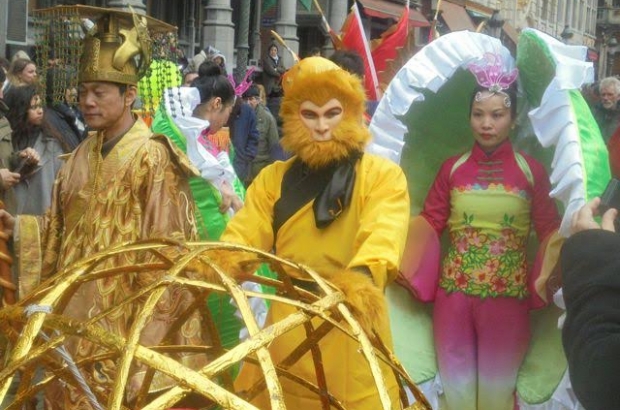- Daily & Weekly newsletters
- Buy & download The Bulletin
- Comment on our articles
Belgian-Chinese relations: a long road well-travelled
The elaborate festivities celebrating Chinese New Year in central Brussels this weekend were the beginning of a year-long series of events commemorating 45 years of diplomatic relations between China and Belgium.
But interchanges between the two peoples go much farther back: in 1679 Father Ferdinand Verbiest, a Jesuit from Tielt designed and built the first self-propelled vehicle (the first automobile) and demonstrated it for the Emperor in the Great Courtyard of the Forbidden City in Beijing.
During the First World War, the Chinese came to Belgium to work and help the war effort. Some are buried in Flanders Fields - others survived and stayed in Belgium to found the Chinese community. The community has grown over the years with one estimate putting the figure at 30,000 Chinese in Belgium - about half of whom have acquired Belgian dual-citizenship.
As well as the streets around Sainte-Catherine in Brussels, the Chinese community has outposts in many Belgian cities and towns, including Liège, Bruges, Mons, Namur, and a Chinatown near the central station in Antwerp.
Antwerp will play an important role in the future of Belgian-Chinese relations as one of the main termini for a massive, multipronged Chinese project: The Silk Road Economic Belt and the 21st-Century Maritime Silk Road which will integrate Eurasia into a more cohesive economic area.
Flanders is already home to about 100 Chinese companies - and only a few days ago, the Industrial and Commercial Bank of China opened a branch in Antwerp. The Chinese ambassador to Belgium, Qu Xing, says: "The New Silk Road initiative will promote a better conductivity between China and Europe. Belgium is at the other end of the Silk Road. I think the port of Antwerp will benefit a lot."
At a new year's reception organised by the Flanders-China Chamber of Commerce last week, the ambassador said Chinese firms still had "great confidence in Belgium". Flemish minister-president Geert Bourgeois, also speaking at the event, said he hopes that Flanders will play an increasingly important role as a "gateway to Europe" for Chinese businesses and "a major player in the introduction and distribution of new Chinese products into the important European market".
With 11 major economic agreements signed between the two countries over the last year and a new Chinese cultural centre in Brussels, Belgium and China are continuing and expanding a long road of mutual cooperation. Bilateral trade between China and Belgium grew slightly in the 11 months to the end of November 2015, at €19.64bn. China is Belgium’s second largest trading partner outside the EU, and Belgium remains China's seventh largest trading partner in the EU.
Among the other components of the New Silk Road project is a high-speed train connecting Beijing with Berlin, the joint promotion of a railway connection between Antwerp and western China and the new China-Belgium Technology Centre, to be established in Louvain-la-Neuve, with the creation of 1,500 jobs (of which 700 will be held by long-term Chinese expatriates).
Belgian prime minister Charles Michel will pay an official visit to China next month and will attend the Asian Forum in Boao to boost business opportunities between Belgium and Asian nations.
Photo: Richard Harris









